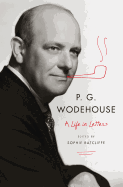
If you haven't read Robert McCrum's masterful 2004 biography of the British comic novelist P.G. Wodehouse, Sophie Ratcliffe's selection from his correspondence will serve quite well until you can get your hands on a copy. While quoting generously from Wodehouse's letters, Ratcliffe also provides interstitial chapters that flesh out his life story. Though he's best remembered for his comedy--even people who've never read a word of Wodehouse recognize "Jeeves" as shorthand for a clever butler--in his own lifetime, the author faced severe disapproval when, trapped in France by the invading Nazis, he recorded a series of radio monologues in 1941 making light of his imprisonment behind enemy lines. ("I can now, of course, see that this was an insane thing to do," he assured the British Foreign Office a year later, "and I regret it sincerely.")
Thankfully, Ratcliffe has no shortage of much happier correspondence on which to draw. Wodehouse always had a keen mind for the business of writing, and knew exactly what he was up to artistically: "Of course my stuff has been out of date since 1914," he jokes to a friend. When he was starting out, he explains, "the only English characters the American public would read about were exaggerated dudes. It's as simple as that."
P.G. Wodehouse: A Life in Letters is a sure treat for anyone who's laughed their way through Uncle Fred in the Springtime or Joy in the Morning and wanted to know more about the man behind them. The rest of you are strongly encouraged to join us. --Ron Hogan, founder of Beatrice.com

